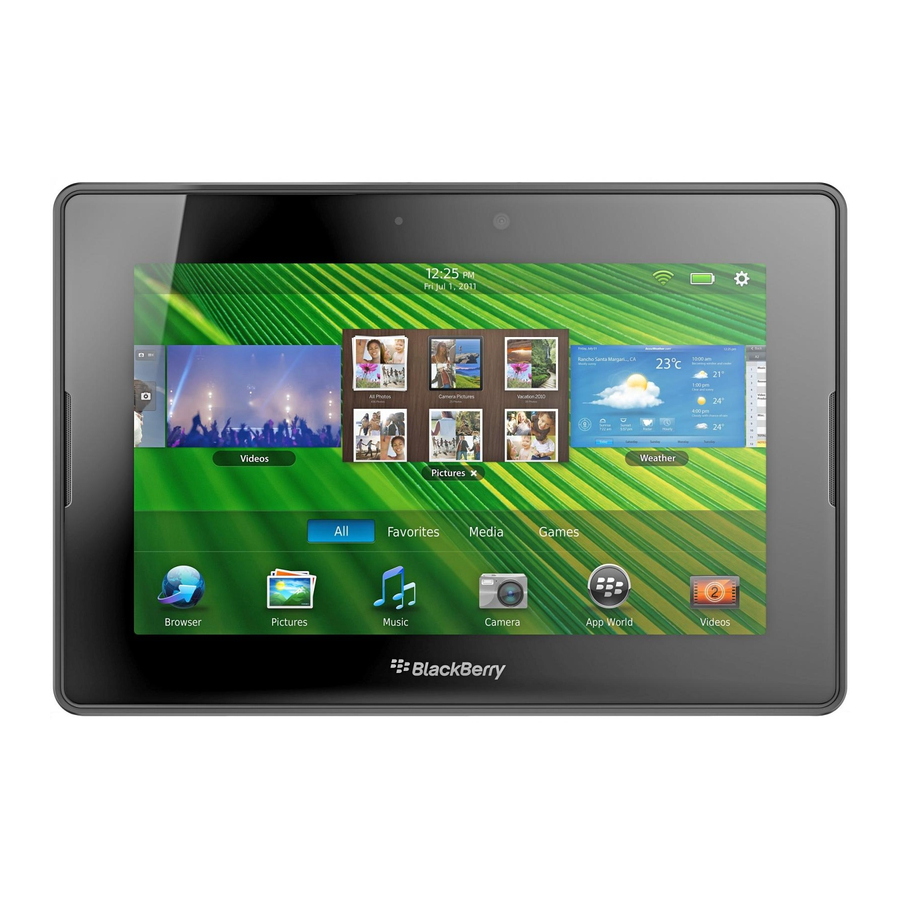Compliance information
Exposure to radio frequency signals
When your BlackBerry PlayBook tablet radio is on, it receives and sends out radio frequency (RF) signals. Your tablet is
designed to comply with Federal Communications Commission (FCC), Ministry of Internal Affairs and Communications
(MIC), and Industry Canada (IC) guidelines respecting safety levels of RF exposure for wireless devices, which in turn are
consistent with the following safety standards previously set by Canadian, U.S., and international standards bodies:
• ANSI/IEEE C95.1, 2005, American National Standards Institute/Institute of Electrical and Electronics Engineers
Standard for Safety Levels with Respect to Human Exposure to Radio Frequency Electromagnetic Fields, 3 kHz to
300 GHz
• National Council on Radiation Protection and Measurements (NCRP) Report 86, 1986, Biological Effects and
Exposure Criteria for Radiofrequency Electromagnetic Fields
• Health Canada, Safety Code 6, 2009, Limits of Human Exposure to Radiofrequency Electromagnetic Fields in
the Frequency Range from 3 kHz to 300 GHz
• EN 62311, 2008, Assessment of electronics and electrical equipment related to human exposure restrictions for
electromagnetic fields (0 Hz to 300 GHz)
• International Commission on Non-Ionizing Radiation Protection (ICNIRP), 2009, Guidelines for Limiting
Exposure to Time-Varying Electric, Magnetic, and Electromagnetic fields (up to 300 GHz)
• Official Journal of the European Union (OJEU), 1999, Council Recommendation of 12 July 1999 on the
limitation of exposure of the general public to electromagnetic fields (0 Hz to 300 GHz)
• MIC, 2001, Article 14-2 of the Ordinance for Regulating Radio Equipment
Specific Absorption Rate data
THIS WIRELESS DEVICE MODEL MEETS GOVERNMENT REQUIREMENTS FOR EXPOSURE TO RADIO WAVES WHEN
USED AS DIRECTED IN THIS SECTION.
The BlackBerry PlayBook tablet is a radio transmitter and receiver. It is designed and manufactured not to exceed the
emission limits for exposure to radio frequency (RF) energy set by the Federal Communications Commission (FCC) of the
U.S. Government, Industry Canada of the Canadian Government (IC), and recommended by The Council of the European
Union when used as directed in the previous section. These limits are part of comprehensive guidelines and establish
permitted levels of RF energy for the general population. The guidelines are based on standards that were developed by
independent scientific organizations through periodic and thorough evaluation of scientific studies.
The exposure standard for wireless devices employs a unit of measurement known as the Specific Absorption Rate, or
SAR. The SAR limit set by the FCC/IC is 1.6W/kg*. The SAR limit recommended by The Council of the European Union is
2.0W/kg**. Tests for SAR are conducted using standard operating positions specified by the FCC/IC with the device
transmitting at its highest certified power level in all tested frequency bands. Although the SAR is determined at the
9

